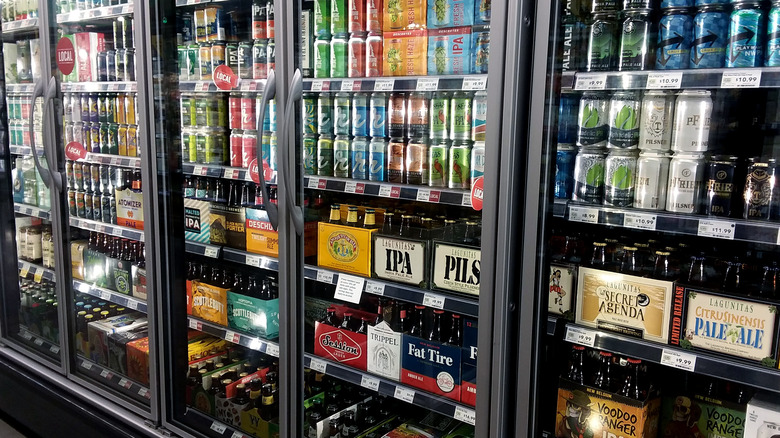
Neither beer nor soda is considered a healthy drink. Both are indulgences recommended to be enjoyed in moderation. But if you wanted to opt for the healthier of the two options, which would you choose? Let’s break down the nutritional information of each one.
There are many different brands and varieties of beer. Typically made from water, grain, hops, and yeast, this alcoholic drink usually comes in regular and light versions. Regular beer typically contains about 150 calories in a standard bottle, 12 grams of carbohydrates, and 0 grams of fat (via The Spruce Eats). Light beer generally contains fewer calories and carbohydrates, although the exact numbers will vary by product.
While those numbers don’t sound too bad, beer still isn’t recommended by most nutritionists. Liquid calories are hard to monitor, Hillary Wright, R.D., and a nutrition consultant for the National Beer Wholesalers Association, told WebMD. Alcohol can also make you hungry and more prone to overeating. The fact that beer is alcoholic also needs to be noted, as frequent alcohol consumption can increase your risk of liver cancer, stroke, and obesity.
Soda is a nonalcoholic drink but isn’t any healthier

Like beer, there are many different brands and varieties of soda. This drink usually consists of carbonated water, sugar, and artificial colorings. According to Verywell Fit, a 12-ounce can of Coca-Cola contains 140 calories, 39 grams of carbohydrates, 0 grams of fat, and 39 grams of sugar. Diet sodas are immensely popular and usually contain 0 grams of sugar because they are made with artificial sweeteners instead.
It is widely agreed upon in the health community that soda is not good for you. According to the Centers for Disease Control and Prevention, the frequent consumption of “sugar-sweetened beverages” is correlated with a long list of health concerns, including “weight gain/obesity, type 2 diabetes, heart disease, kidney diseases, non-alcoholic liver disease, tooth decay and cavities, and gout, a type of arthritis.” Diet sodas made with artificial sweeteners are not necessarily any better, as they contain chemicals like aspartame or saccharin.
So which is worse? It’s hard to say as it also depends on how often you consume each beverage. Neither drink has any nutritional value and both can lead to adverse health conditions. However, both can be enjoyed in moderation as part of a well-balanced diet and exercise routine.




